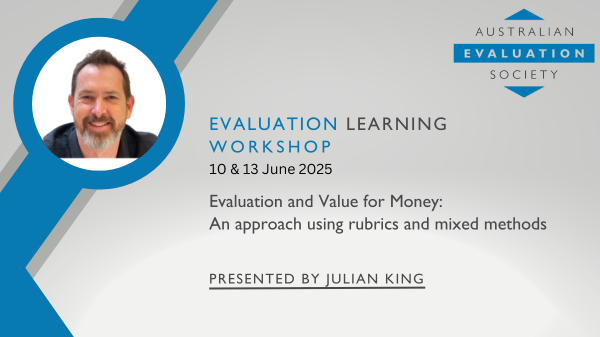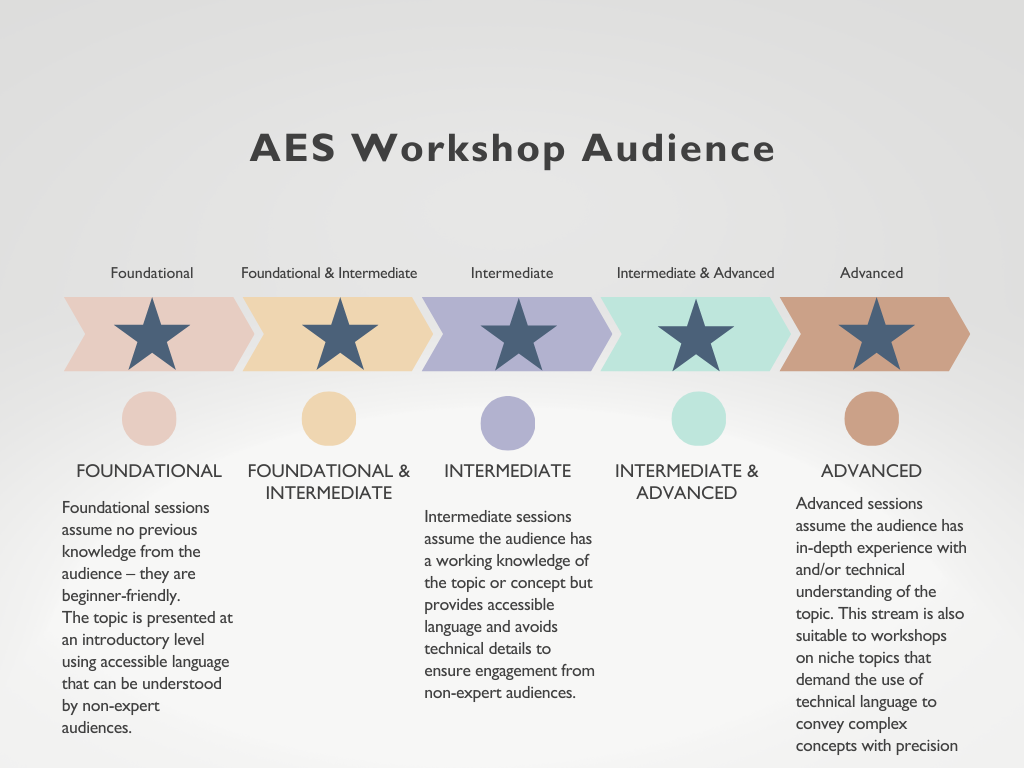Workshop: Evaluation and Value for Money: An approach using rubrics and mixed methods (Online 10 & 13 June 2025)

Workshop: Evaluation and Value for Money: An approach using rubrics and mixed methods
Date and time: Tuesday 10 June and Friday 13 June 2025, 10.00am to 1.00pm AEST (registration from 9.45am) Registrants are to attend both sessions. (full day workshop - 2 sessions)
Venue: Via Zoom. Details will be emailed to registrants just prior to the workshop start time
Facilitator: Julian King
Register online by: 9 June 2025, unless sold out prior limited to 25 participants.
Fees (GST inclusive): Members $325.00, AES Organisational member staff $460.00, Non-members $535.00, Student member $155.00, Student non-member $250.00* (GST inclusive) *Students must send proof of their full-time student status to
Workshop Overview
It is important for good resource allocation, accountability, learning and improvement that policies, programs, and other initiatives undergo rigorous evaluations of value for money (VfM). Many evaluators, however, lack training and experience in this area. This workshop offers a set of techniques to address that gap. Combining strengths of evaluation and economics, this approach, called Value for Investment, builds on theory and practice that will already be familiar to many evaluators, although there are also many evaluators and commissioners for whom these techniques may be new. The approach is intuitive to learn and practical to use.
Workshop Content
This participatory workshop provides practical guidance, underpinned by a sound theoretical framework, for evaluating VfM. It focuses on unpacking a process of explicit evaluative reasoning (using rubrics) and the use of mixed methods (qualitative, quantitative, and economic).
A sequence of steps will be shared, that when followed, help evaluators and commissioners develop and use context-specific definitions of good performance and VfM. These definitions provide a system for ensuring the evaluation: is aligned with the design and context of the policy, program, or initiative; collects and analyses the right kinds of evidence; draws sound conclusions; and answers VfM questions. Exercises and examples will be shared throughout the workshop.
Session One covers the practical steps involved in designing a VfM framework. Session Two covers the steps involved in conducting a VfM assessment, as well as some evaluation theory and conceptual principles underpinning the approach, and a few tips and tricks for applying the approach in the real world.
The workshop includes a brief overview of economic methods of evaluation (e.g., cost-benefit analysis) including considerations for determining when to use them in a VfM assessment, and when to combine them with other evidence and values. Note that it doesn’t provide detailed instruction in the design and implementation of economic evaluations.
Workshop Objectives
Participants will learn how to:
-
frame an evaluative question about VfM
-
develop rubrics, comprising criteria (aspects of performance) and standards (levels of performance), to provide a transparent basis for making sound judgements about VfM
-
combine multiple sources of evidence to support nuanced evaluative judgements
-
incorporate economic evaluation within a VfM framework, where feasible and appropriate
-
interpret the evidence, using criteria and standards, to make sound evaluative judgements
-
present a clear and robust performance story, guided by the criteria and standards.
PL competencies
This workshop aligns with competencies in the AES Evaluator’s Professional Learning Competency Framework. The identified domains are:
-
Domain 2 – Evaluation theory
-
Domain 3 – Culture, stakeholders and context
-
Domain 4 – Research methods and systematic inquiry
-
Domain 7 – Evaluation Activities
Who should attend?
This workshop is suitable for evaluators of all levels of experience, because it introduces new and emerging topics in a practical and intuitive way. For example, it introduces a process of evaluative reasoning (including tips and tricks for developing rubrics) that can be used in any evaluation (not just VFM), and it introduces novel VFM concepts that will be new and useful to people from all levels of experience.

Workshop start times
-
VIC, NSW, ACT, TAS, QLD: 10.00am
-
SA, NT: 9.30am
-
WA: 8.00am
-
New Zealand: 12.00pm
-
For other time zones please go to https://www.timeanddate.com/worldclock/converter.html
About the facilitator
Julian King specialises in evaluation and value for money, helping decision makers, evaluation teams and stakeholders to assess the value of policies and programs. Julian is the Director of Julian King & Associates Ltd, a member of the Kinnect Group, an Associate of Oxford Policy Management, an Honorary Fellow at the University of Melbourne and University Fellow at Charles Darwin University. Julian’s PhD developed the Value for Investment approach, a model for combining evaluative reasoning with economic evaluation. The approach is used globally to evaluate complex and hard-to-measure programs and policy reforms.
Event Information
| Event Date | 10 Jun 2025 10:00am |
| Event End Date | 13 Jun 2025 1:00pm |
| Cut Off Date | 09 Jun 2025 4:00pm |
| Location | Zoom |
| Categories | Online Workshops |
We acknowledge the Australian Aboriginal and Torres Strait Islander peoples of this nation. We acknowledge the Traditional Custodians of the lands in which we conduct our business. We pay our respects to ancestors and Elders, past and present. We are committed to honouring Australian Aboriginal and Torres Strait Islander peoples’ unique cultural and spiritual relationships to the land, waters and seas and their rich contribution to society.
